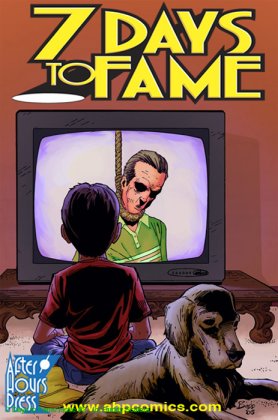Sure,
that sounds cynical, but at the height of the reality television
craze, it certainly seemed to be on track. Fear
Factor regularly puts contestants through death-defying
stunts. The late unlamented Temptation Island certainly
did what it could to have relationships die horribly on
camera.
Let's
face it; some of these people are so unlikable that we we'd
welcome at least faked death for them. See the success of
Kill Reality on E! last summer, or House
of Wax. We want to see Paris Hilton die.
When
comics writer Buddy
Scalera announced 7 Days To Fame, a mini-series
about a fatal reality television show, it had the promise
of dark satire. Two issues in, however, and it has become
a reasonable premise about a society growing ever more unreasonable.
In the first issue, it arises by accident. Ironically,
it's even a celebration of life. Late night talk-show host
Marc Figliano devotes seven shows to dissecting an elderly
woman's life story. Dying of cancer, Lida Wentworth gets
her chance to finally be noticed. Though we only get brief
soundbites, it's involving, and a good sign of Scalera's
talent as a writer.
Then she pulls out a gun and blows her brains out.
It's not exactly a shocking moment to us. The cover of
the book, after all, features an attractive woman with a
gun in her mouth. But it's certainly shocking to Marc.
Scalera keeps the book from being coldly exploitative
by focusing on the moral issues, even as they start spinning
out of control. As the second issue opens, Figliano and
his producer have both been fired. Morose, the talk-show
host sits drinking his ambivalence away, when two men approach
him with a check.
They represent a website. Naturally, the clip of Lida
blowing her brains out has been a top download, and they
figured they owe Figliano royalties …and a further offer.
Since their site is pay per view, people have to know exactly
what they're going to see, so why not set up what has become
known in the media as "7 Days to Fame?"
It starts out as almost legitimate. But you can see where
Scalera may be going when a girl being interviewed on camera
ditzily says she'd love to be on the show. What begins as
a way for terminal patients to be heard has become far more
about the fame. Of course, we knew this would happen. Figliano
had to know it would happen. But he, too, wanted the fame.
Though a little cartoony, Dennis Budd's art serves the
story well. He makes good facial distinctions, and good
emotional reads so we have a sense of subtext.
The second issue kicks the ethical debate up a notch,
and to the book's credit, it also doesn't shy away from
the legal consequences. Those will clearly become bigger
for the third issue.
With Howard Stern moving to Sirius in order to get out
from under the FCC, it does seem like the public wants their
entertainment unfettered. And just because they want it
doesn't mean they should get it.






